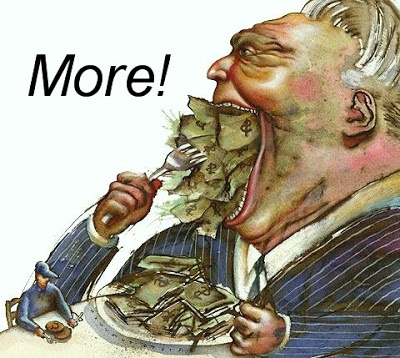
“Ayn Rand’s ‘philosophy’ is nearly perfect in its immorality, which makes the size of her audience all the more ominous and symptomatic as we enter a curious new phase in our society….to justify and extol human greed and egotism.â€
Gore Vidal
In light of the recent outcries by billionaire Tom Perkins for fair and loving treatment, I thought it might be interesting to explore the mindset that pictures the doyens of Wall Street, and those who have taken fortunes out of the dot.com and housing bubbles, as the real victims of the financial collapse and The Recovery™.
I think that part of this comes from the phenomenon that for some people, gratitude is their natural response to good fortune, even if it has come from hard work. Whereas others are possessed by a restlessness, an insatiable spirit, and their response to everything is ‘I deserve more!.’Â
Tom Perkins not only wishes his wealth, and his banal collection of toys, but he wishes to have public adulation as well, or at least the power to compel people to defer to him.
Mr. Frank thinks that this time around the cultural response to a Great Depression is ‘backwards,’ as compared to that of the 1930’s, and one might tend to agree. There certainly has not been the rising of a national sympathy for victims, or a proper outrage at the arrogance and excesses of the financiers.
But this might overlook the fact that the US was a bit of an outlier back then, as only a few countries turned towards progressive reforms, while other developed nations embraced the hardness of totalitarianism, and even went so far as systematically murdering the weak.
But it is a mistake that the US is some sort of paragon, if one recalls John Steinbeck’s The Grapes of Wrath. The allure of selfishness and evil is a natural tendency that we overlook in our economic models, among other things. And we certainly ought not overlook the consecration of the country to the principle that ‘greed is good,’ or more plainly to Mammon, in the latter part of the last century.
I agree with him that Obama has been a pivotal disappointment, and I was interested to hear the reasons why he thought this was so. Overall I found his perspective to be interesting, as though he was not an American historian and journalist, but some foreign observer sharing an exterior perspective of wonderment.
I have started the tape beyond the introductory remarks and welcomes at this talk his gave in Seattle.
Â

